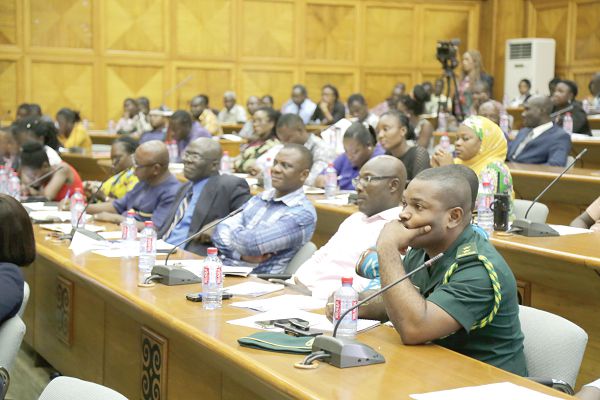A National Assessment Survey report has exposed public institutions as the worst culprits in record keeping and the production of statistics in the country.
The report said even when those institutions produced data, such data were weak and uncoordinated, particularly those generated by the various decentralised institutions.
This came to light at a ceremony to launch the National Assessment Survey report in Accra yesterday.
The survey, which aimed at strengthening statistics in national development planning, was conducted by the National Development Planning Commission (NDPC) and the Ghana Statistical Service (GSS), with support from the United Nations Development Programme (UNDP) and UNICEF.
Scope
The research covered Ministries, Departments and Agencies (MDAs), Regional Coordinating Councils (RCCs) and the Metropolitan, Municipal and District Assemblies (MMDAs).
According to the survey, about 70 per cent of users of public data felt that the quality of data produced by public institutions was poor.
The report also said accessibility and use of the data produced by the MDAs were problematic, as users did not easily get access to the data due to administrative bottlenecks or the unwillingness of some staff of the institutions to release such information.
The report further brought to the fore challenges associated with the production of the statistics which, it said, must be addressed to improve the national statistical system.
“Ghana’s statistical system is still unable to cope with emerging internal and external demands for relevant, reliable and timely statistics for policy making, development planning and programme evaluation”, the report said.
Key findings
Giving highlights of the study, a research fellow of the School of Education and Leadership of the University of Ghana, Dr Clement Adamba, said it took many months for the conductors of the research to access data from government agencies and departments.
He said the data obtained in many instances were consistently incomplete and inadequately disaggregated, while some of the information did not fit the purpose for which it was requested.
While about 63 per cent of those public institutions did not have a central database for storing data, Dr Adamba said some of them lacked the necessary funds and logistics such as computers to facilitate their work.
Dr Adamba painted a poor picture of the current state of the country’s statistical development and said monitoring of progress on global, regional and national development agenda remained a challenge, as the conductors had to rely on incomplete statistics to address some major data gaps.
Recommendations
He, therefore, called for the institutionalisation of statistics production, establishment of multi-sectoral coordinating agencies, the adoption of a legal framework to reflect international standards and the financing of the production of statistics, as well as investment in Information and Communications Technology (ICT) for statistics production.
The Minister of Planning, Professor George Gyan-Baffour, who launched the report, said reliable, timely and accessible statistics were crucial for making informed policy decisions and the effective monitoring of progress in the development agenda.
Prof. Gyan-Baffour, therefore, stressed the need for the national statistical system to be strengthened to ensure the proper coordination of the production of statistics for evidence-based decision making.
RTI Bill
Touching on the Right to Information (RTI) Bill, the acting Chief Director of the Ministry of Parliamentary Affairs, Dr Evans Aggrey-Darkoh, expressed the conviction that the passage of the bill would make public institutions work harder to provide valid, quality and reliable data to satisfy demands.
He expressed the hope that the bill, which had been in Parliament for a long time, would be passed before the end of the year to empower the citizens to demand a high level of accountability from duty bearers and also enhance the democratic credentials of the country.
The acting Director General of the NDPC, Dr Grace Bediako, for her part, said the findings of the report had been implemented by a joint NDPC and GSS Advisory Committee to advance the availability and use of statistics within the national planning system.

